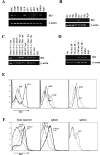Flt3 ligand regulates dendritic cell development from Flt3+ lymphoid and myeloid-committed progenitors to Flt3+ dendritic cells in vivo
- PMID: 12874263
- PMCID: PMC2194067
- DOI: 10.1084/jem.20030323
Flt3 ligand regulates dendritic cell development from Flt3+ lymphoid and myeloid-committed progenitors to Flt3+ dendritic cells in vivo
Abstract
Stimulation of Flt3 receptor tyrosine kinase through its cognate ligand expands early hematopoietic progenitor and dendritic cells (DCs) in humans and mice. The exact developmental stages at which hematopoietic progenitors express Flt3, are responsive to its ligand, and subsequently develop to DCs, are not known. Here we show that common lymphoid and common myeloid progenitors, as well as steady state DCs in thymus, spleen, and epidermis, express Flt3. The receptor is down-regulated once definitive B cell, T cell, and megakaryocyte/erythrocyte commitment occurs, and Flt3 is not detectable on other steady state hematopoietic cell populations. Upon in vivo Flt3 ligand (Flt3L) administration, Flt3+ progenitor cells and their progeny DCs are expanded, whereas Flt3- downstream progenitors are not, or are only slightly increased. Transplantation of common lymphoid and common myeloid progenitors and subsequent Flt3L injection increases progeny DCs of both precursor populations. These findings provide a definitive map of Flt3 expression in the hematopoietic hierarchy and directly demonstrate that Flt3L can drive DC development along both the lymphoid and myeloid developmental pathways from Flt3+ progenitors to Flt3+ DCs.
Figures




References
-
- Matthews, W., C.T. Jordan, G.W. Wiegand, D. Pardoll, and I.R. Lemischka. 1991. A receptor tyrosine kinase specific to hematopoietic stem and progenitor cell-enriched populations. Cell. 65:1143–1152. - PubMed
-
- Small, D., M. Levenstein, E. Kim, C. Carow, S. Amin, P. Rockwell, L. Witte, C. Burrow, M.Z. Ratajczak, A.M. Gewirtz, et al. 1994. STK-1, the human homolog of Flk-2/Flt-3, is selectively expressed in CD34+ human bone marrow cells and is involved in the proliferation of early progenitor/stem cells. Proc. Natl. Acad. Sci. USA. 91:459–463. - PMC - PubMed
-
- Lyman, S.D., and S.E. Jacobsen. 1998. c-kit ligand and Flt3 ligand: stem/progenitor cell factors with overlapping yet distinct activities. Blood. 91:1101–1134. - PubMed
-
- Mackarehtschian, K., J.D. Hardin, K.A. Moore, S. Boast, S.P. Goff, and I.R. Lemischka. 1995. Targeted disruption of the flk2/flt3 gene leads to deficiencies in primitive hematopoietic progenitors. Immunity. 3:147–161. - PubMed
-
- McKenna, H.J., K.L. Stocking, R.E. Miller, K. Brasel, T. De Smedt, E. Maraskovsky, C.R. Maliszewski, D.H. Lynch, J. Smith, B. Pulendran, et al. 2000. Mice lacking flt3 ligand have deficient hematopoiesis affecting hematopoietic progenitor cells, dendritic cells, and natural killer cells. Blood. 95:3489–3497. - PubMed
Publication types
MeSH terms
Substances
Grants and funding
LinkOut - more resources
Full Text Sources
Other Literature Sources
Miscellaneous

